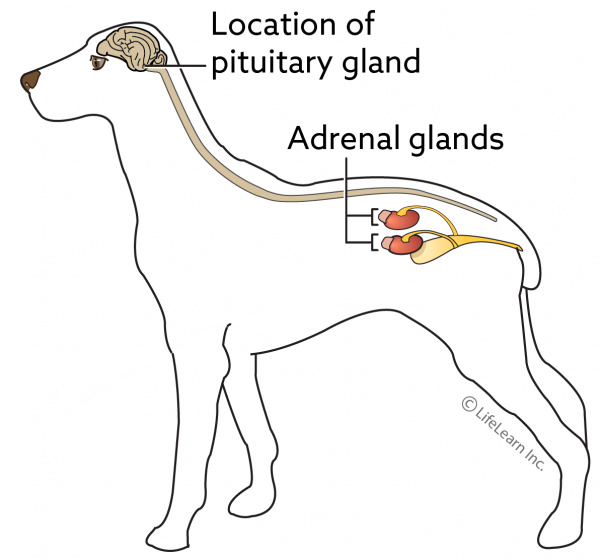Contents
What is Addison’s Disease?

Addison’s disease refers to an endocrine or hormonal disorder where the adrenal gland produces inadequate hormones. This disease is also called hypoadrenocorticism. The adrenal glands are in charge of producing corticosteroids and natural hormones which are essential to lead a healthy life. Your pet dog can suffer from this disease when the adrenal glands fail to deliver their job due to the disruption caused by infections, tumors, and the like.
Symptoms of Addison’s Disease
It is easier to detect when your dog is not in the best of health. For a proper diagnosis of Addison’s disease, you as the dog owner can observe your German Shepherd or your beloved dog having:
- A nauseating feeling, leading to recurrent vomiting
- A lackadaisical attitude gradually transforming into lethargy is another big sign that should bother you
- Muscle pain and weakness, making your dog less active
- Diarrhea and loss of appetite lead to weight loss
- Repetitive episodes of collapses
- Often the coat of the dog lacks that sheen and becomes thin with dandruff surfacing
Diagnosis of Addison’s Disease
If diagnosed at an advanced stage, the dog plagued by Addison’s Disease can suffer shocks which are often fatal blows and quite scary leading to death. You can find your dog (GSD or any other breed) severely ill, suffering from low blood pressure, or going into a coma if they are inflicted with Addison’s Disease in the advanced stages. It is the changes that are analyzed in routine blood work which pronounces the medical condition of the dog. It is the levels of sodium, and potassium in the blood’s content that reveal whether a dog is suffering from this disease. For the confirmation process, the ACTH test is carried out. If your dog is suffering from major kidney problems, then the vet doctors recommend IV fluids.
The Treatment of Addison’s Disease
The ACTH test is the parameter for a proper diagnosis of Addison’s Disease which can tell you the truth about your German Shepherd’s health condition. If the test proves to be positive, then it signifies that your dog is affected by Addison’s Disease. The test takes a span of two hours. For the medical test, a dog is injected with synthetic ACTH hormone. After the passing of an hour, his blood sample is taken. If the readings in the medical report remain unchanged, then it shows that the dog is inflicted with Addison’s Disease.
No Permanent Cure
If your beloved dog is blighted by fate and is inflicted with Addison’s Disease, there is no long-term cure that the vet surgeons can prescribe to you. As the owner, you need to take good care of your dog and constant monitoring all through life. You need to ensure that the prescribed medicine, which is usually Prednisone, is taken by your dog timely. This process of oral medication pays off in substituting for the missing levels of hormones in your dog. It is the regular check-ups, monitoring of the daily activities of a dog, and his appetite level, which act as the indicator of whether it is in good health or not.

 Pituitary Dwarfism in German Shepherd Dogs
Pituitary Dwarfism in German Shepherd Dogs